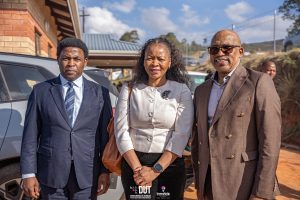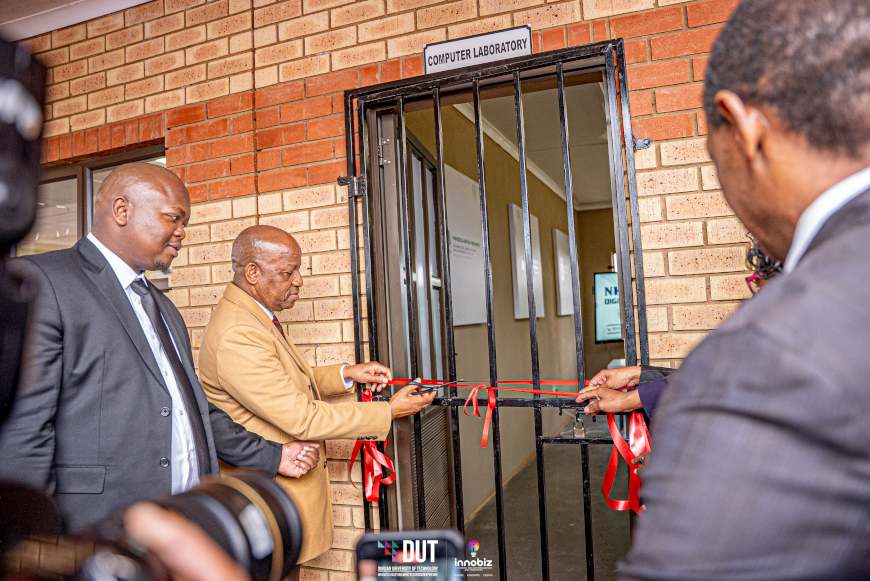KwaZulu-Natal Premier, Honourable Thamsanqa Ntuli has hailed the opening of the Vumanhlamvu Digital Centre in Nkandla, brought by the collaborative efforts of the innobiz DUT Centre for Entrepreneurship and Innovation alongside its partners the Moses Kotane Research Institute and the KZN provincial government, as a result of the sterling power of collaboration between organisations.
Premier Ntuli was speaking to the innobiz DUT team on the sidelines of the launch of the Digital Centre in the underserved rural area of Vumanhlamvu, which falls under the vast northern KwaZulu-Natal town of Nkandla, on Monday 11 August 2025.
The programme featured distinguished speakers and guests including KZN Premier Mr Thami Ntuli, Rev Musa Zondi,MEC for Economic Development, Tourism, and Environmental Affairs (EDTEA), Professor Thandwa Mthembu, Vice-Chancellor and Principal of the Durban University of Technology (DUT), Professor Fulufhelo Nemavhola, Deputy Vice-Chancellor: Research, Innovation and Engagement at DUT, representatives from the US Embassy, Mr Charles Mpofu of Nedbank and traditional leaders of the community.
The launch of the Vumanhlamvu Digital Centre, donated by Moses Kotane Research Institute, formed part of the wider Adopt-A-School project pioneered and extensively driven by the innobiz DUT Centre since 2022 in which 20 schools were adopted participate in the “Grow and Thrive School Garden Challenge”.
A special highlight of the day’s proceedings was the Entrepreneurship Awards ceremony, where innobiz DUT honoured schools participating in the Adopt-A-School Entrepreneurship initiative, “The Grow and Thrive School Garden Challenge”.
These awards celebrated young changemakers and passionate teachers from Vumanhlamvu Primary School, Ntolwani Primary School and Mnyakanya High School, who demonstrated creativity, innovation and sustainability in their school based agricultural initiatives. The winning schools each received monetary prizes to help them purchase additional garden resources, ensuring their projects continue to thrive and expand.
The 2025 leg of the project themed: “Adopt-A-School: Building Future Entrepreneurs through Agriculture, Technology, and Financial Literacy for Kids” also saw a computer lab being launched at the Bizimali High School, also in Nkandla, in a bid to bridge the digital divide and expose rural youth to a myriad of digital and technological opportunities.
In alignment with the values and principles of seeking collaboration to advance societal impact, as enshrined in DUT’s ENVISION2030 strategy, innobiz collaborated with the MKRI to ensure that the dream of the Digital Centre aimed at bridging the digital divide between the youth in far flung rural areas such as Nkandla and their counterparts in semi-urban and urban areas.
“We need to close the gap that exists of inequality between the most rural communities, township communities, and the urban communities, hence I was making a call that it’s important for universities to reach out to rural people and communities. Universities experience an influx of applications, but upon analysis you realise that the majority of people are people coming from areas that have already progressed to a better level. So it’s important that this collaboration between the Durban University of Technology, the Moses Kotane Research Institute, the Department of Economic Development, Tourism and Environmental Affairs and the Nkandla Local Municipality is finding expression, not only here in Vumanhlamvu but also in other parts of KwaZulu-Natal,” the Premier said.
Premier Ntuli said that the youth of the two benefitting communities, Vumanhlamvu and Bizimali, had struck gold with the launching of the Digital Centre and the Computer Lab as they would now be able to participate in the digital economy and bring new solutions to problems plaguing the global community.
“It is going to enable them to compete with the youth from countries such as the United States of America, Asia, and whichever countries that are mostly developed compared to South Africa. It is a digital journey that must be embraced by tertiary institutions such as DUT. I am proud of the DUT that they are able to be here in Nkandla and I expect that as we move to other rural and township communities we walk together that journey to reshape the future of our province, because what we are doing here is to shape the future of our province,” Premier Ntuli elaborated.
One of the key aspects of the Adopt-A-School project was to inculcate an entrepreneurial spirit, mindset and skills into primary and high school learners, and Premier Ntuli said that the translation of agriculture into the digital economy would ensure that at grassroots level entrepreneurs are groomed where they resided and would be changing the lives of their own communities in which they resided.

DUT’s Professor Fulufhlelo Nemavhola, DVC:RIE, Ms Nontokozo Ngobo, innobiz DUT Manager, Professor Thandwa Mthembu, Vice-Chancellor and Principal at DUT.
“It’s quite a very important programme and we must ensure that we run with it in all disadvantaged communities,” Premier Ntuli added.
DUT’s Professor Fulufhelo Nemavhola, DVC:RIE, emphasised the importance of collaboration, saying that this aligned with the quad-helix model employed by DUT which meant that the University’s role was to work hand in hand with stakeholders such as the various spheres of government, corporates and the local communities.
More than teaching the school learners entrepreneurial skills, Prof Nemavhola said that it was also about imparting on them the fundamentals of life, including discipline, time management, and the ability to organise themselves as human beings.
“The principles of entrepreneurship are a cherry on the top because once they are able to organise themselves, they would be able to do almost everything. It’s very important to teach them these principles when they are still young so that they are able to carry them forward,” said Prof Nemavhola said.
Switching his focus to the launch of the Digital Centre at Vumanhlamvu and the Computer Lab at Bizimali Prof Nemavhola emphasised the significance of digital and internet connection.
“If communities don’t have some kind of connectivity or internet, they are going to be left behind because anyway knowledge is through the internet, knowledge is through Artificial Intelligence (AI) and without connectivity you are not able to gain much. If you look at AI as an example there’s a lot that, through access to the internet, communities can learn and they can even innovate through AI and so forth. It’s very important for communities like these to have access technology, and otherwise they will be left behind because development in the near future is going to be through connectivity and the advancement of technology,” Prof Nemavhola added.
Dr Thandeka Ellenson, CEO of the Moses Kotane Research Institute, said that it was critical that all partners collaborate to bring to life projects such as the Digital Centre in Vumanhlamvu, adding that each partner plays an important role.
“Government brings support, institutions like innobiz DUT bring the innovative part, Moses Kotane Research Institute brings the infrastructure, so it’s very important that we collaborate and have each and every partner to contribute towards the development of the society which then leads to economic development which is what we are for,” Dr Ellenson said.
She added that the launch of the Vumanhlamvu Digital Centre and the Bizimali Computer Lab were part of the KwaZulu-Natal provincial government’s digital transformation strategy which has pillars including connecting the society to the internet, digital skilling which ensures that once they are connected they are skilled in order to participate in the digital economy and ensuring that they are on par with other societies around the globe.
“In today’s world we are going digital in every way, so for a member of society to participate in this digital economy they need to be digitally skilled and this is necessary in numerous sectors, including agriculture, tourism, and manufacturing which are now based on the fifth Industrial Revolution.
“The 5IR requires that members of the society be skilled digitally, so this is very important because we are equipping the communities to be able to participate in those spaces. In addition to that we are making sure that those that would not have had access to digital or ICT infrastructure are included in this day,” Dr Ellenson explained.
Pictured: KZN Premier, Honourable Thamsanqa Ntuli officially opening the Nkandla Digital Centre.
Photographer: Khonzinkosi Magcaba.
Samkelo Mtshali




